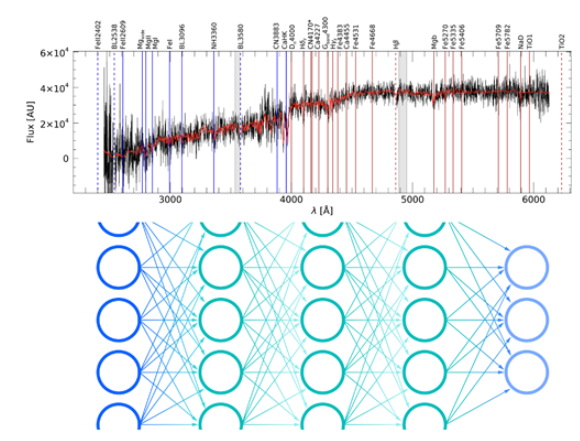
Galaxies
Bachelor/Master
Site: Merate (LC)
Duration
3 months (bachelor) – 1 year (master)
Tutor
Benjamin Granett, Angela Iovino, Marcella Longhetti
Contact
benjamin.granett AT inaf.it
angela.iovino AT inaf.it
marcella.longhetti AT inaf.it
Description
CONTEXT: Spectroscopy is one of the primary tools to measure the properties of galaxies including the age, star formation rate and chemical composition, which are fundamental to understand the physical processes that drive galaxy evolution. The standard methodology for estimating the galaxy properties involves measuring spectral line indices and fitting them to stellar evolution models. Machine learning algorithms offer an attractive means to extract information from galaxy spectra. Unsupervised learning algorithms compress the most relevant information that can be used to classify galaxies and identify rare and interesting types. Supervised learning algorithms are able to efficiently make inference about the underlying physical parameters.
PROPOSED WORK: The aim of this project is to develop a machine learning model for analyzing galaxy spectra observed with the WEAVE instrument. Based on the interest of the student, we will pursue unsupervised algorithms for characterizing galaxy spectra, or supervised algorithms to measure galaxy physical properties. We will start with simulated WEAVE-StePS data that were constructed using a library of model spectra. These simulated data have realistic noise levels, which can make it challenging to precisely classify spectra or recover parameter estimates. We will train and test machine learning algorithms that can deal with the varying noise levels in the data and characterize the accuracy and precision of the results.
SKILLS: The interested student is expected to have a basic knowledge of programming in python to use existing machine learning libraries (scikit-learn, tensorflow).
[Image Credit: Simulated WEAVE-StePS spectrum – Costantin+2019]
